
Dragana Todorović, better known under the stage name Bebi Dol, is a Serbian and Yugoslav singer and songwriter. Born in Belgrade, she made her solo debut in 1981 with the successful single "Mustafa". She rose to further prominence and nationwide popularity with her 1983 debut album Ruže i krv. Bebi Dol represented Yugoslavia at the Eurovision Song Contest 1991 with "Brazil". She has released four studio albums and a live album to date, had a number of hit songs in Serbia and former Yugoslavia and had collaborated with a number of prominent acts of the Serbian and Yugoslav music scenes.
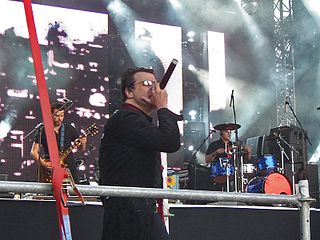
Van Gogh is a Serbian and former Yugoslav rock band from Belgrade.
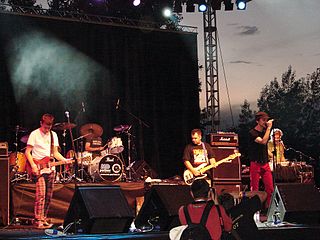
Obojeni Program is a Serbian alternative rock band from Novi Sad. The band are pioneers of the Serbian alternative rock scene. The first letters of the band's first seven studio albums form an acronym of their home town. They have performed at every Exit festival since the first in 2000, with the exception of the virtual Exit held in September 2020.

Kerber is a Serbian and Yugoslav hard rock band formed in Niš in 1981.
Generacija 5 is a Serbian and Yugoslav rock band formed in Belgrade in 1977.
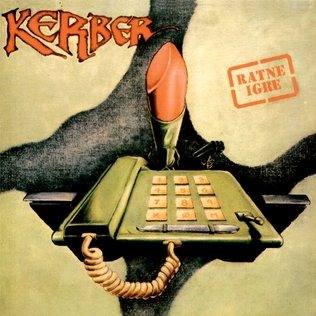
Ratne igre is the second studio album from Serbian and Yugoslav hard rock band Kerber, released in 1985.

Seobe is the third studio album by Serbian and Yugoslav hard rock band Kerber, released in 1986.

Ljudi i bogovi is the fourth studio album from the former Yugoslav and Serbian hard rock band Kerber, released in 1988.

Osvajači are a Serbian and Yugoslav hard rock band formed in Kragujevac in 1990.

Peta strana sveta is the fifth studio album from Serbian and Yugoslav hard rock band Kerber, released in 1990.

Zapis (transl. Inscription) is the sixth studio album by Serbian and Yugoslav hard rock band Kerber, released in 1996.
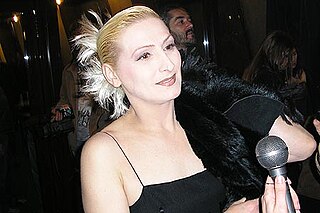
Snežana Mišković, better known by her stage name Viktorija, is a Serbian and Yugoslav semi-retired rock singer. Known for her raspy voice, Viktorija was one of the most popular and prominent female vocalists of the Yugoslav rock scene.
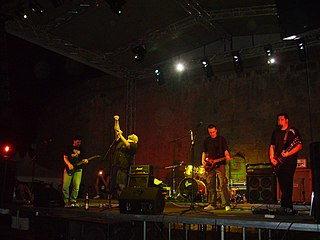
Bjesovi are a Serbian alternative rock band formed in Gornji Milanovac in 1989. The band was one of the most notable acts of the 1990s Serbian rock scene.

Goran "Gale" Šepa is a Serbian rock and heavy metal singer. He is best known as the lead singer for the Serbian and former Yugoslav hard rock band Kerber. Šepa is known for his melodic vocal style.

Sam is the second studio album from Serbian and Yugoslav hard rock band Osvajači, released in 1995.

U Škripcu was a Yugoslav rock band formed in Belgrade in 1980.

Antologija 1983–1998 I is the first compilation album by Serbian and Yugoslav hard rock band Kerber, released in 1998. It was the first of two compilation albums the band released in 1998, the second one being Antologija 1983–1998 II. The album features songs from the band's studio albums released during the 1983–1996 period.

Antologija 1983–1998 II is the second compilation album by Serbian and Yugoslav hard rock band Kerber, released in 1998. It was the second of two compilation albums the band released in 1998, the first one being Antologija 1983–1998 I. The album features ballads and acoustic songs from the band's studio albums released during the 1983-1996 period.

Slomljena Stakla was a Yugoslav pop rock band formed in Belgrade in 1982. They were a prominent act of the 1980s Yugoslav rock scene.
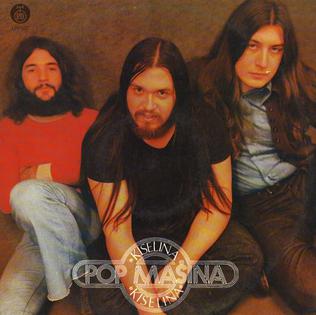
Kiselina is the 1973 debut album by Yugoslav progressive rock band Pop Mašina.



















